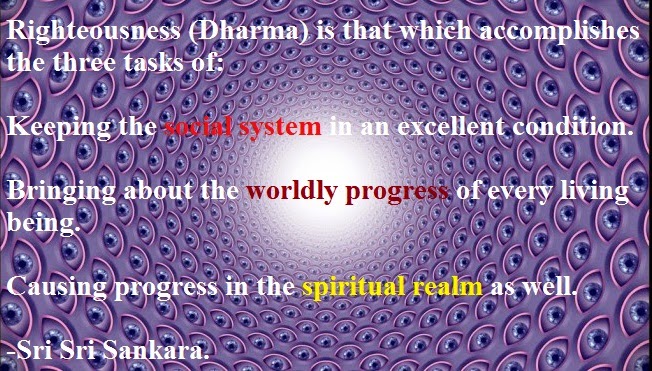http://www.speakingtree.in/public/spiritual-blogs/seekers/self-improvement/dharma-as-i-understand-and-would-like-to-practice
There is a set of codes of conduct prescribed by Vedas and Upanishads to thread the path of righteousness called Dharma. Dharma gets its hold from the word “Dhri” which means “to hold” the residence of this world and the entire creation together. Dharma is the moral law combined with spiritual obedience that guides one to excel in life. If one accepts the concept of reincarnation, he understands that the next existence takes shape by that which is determined by the actions undertaken by the body and the mind in the present life. Hence in order to achieve good karma he tries to live life according to Dharma, which is living a life of righteousness.
This concept of karma induces the moral ethics in him to do what is right to himself, his family, his associates, his community, and in all to the universe he is living in. Dharma is like a cosmic rule and if one goes against it, he will have to face the result in bad Karma. So, Dharma affects the future according to his Karma. Therefore to have a life of peace and abundance the individual has to do good karma. Dharma therefore implies duty with a code of conduct. For example, Hinduism endorses the idea that it is one's dharma to marry, raise a family and provide for that family in whatever way is necessary. But that does not mean the person has to steal or rob to feed his family.
Like wise anything that helps an individual to align with Absolute is Dharma and that which causes hindrance is Adharma. Vedas glorify the part of Dharma and say: “Prithivinam Dharman Dhritam” meaning-“World is upheld by Dharma.” Dharma is the combination of spiritual radiance and the human endurance and this is the reason for it to be Ritam (Eternal Truth).
According to the ancient scriptures the purpose of life of a seeker is to aspire for the four: Dharma (righteousness), Artha (wealth), Kama (desire), Moksha (liberation). The practice of Dharma gives an experience of immense peace, inner strength and intense calm which is needed to make me self-disciplined so that the other three is attained without any hassles.
There is a mention of the qualities of Dharma in a verse in Manusmriti which is as follows:
“Dhriti Kshama Damosteyam Shouchamindriya Nigrahah
Dheer Vidya Satyamakrodho Dashakam Dharma Lakshanam”
Dheer Vidya Satyamakrodho Dashakam Dharma Lakshanam”
prescribing 10 essential rules for the observance of Dharma: Dhriti (Bravery), Kshama (Forgiveness), Dama (Self-Control), Asteya (Non-Stealing), Saucha (Cleanliness), Indriya nigraha (Sense Control), Dhee (Sense of reasoning), Vidya (Knowledge), Satya (Truthfulness) and Akrodha (Never to lose temper).
Hence following the path of Dharma does not help the seeker alone but indirectly it governs the welfare of the society. The purpose of Dharma is not only to attain a Moksha (union with Absolute) but it also suggests a code of conduct which assists the seeker to enjoy the worldly pleasures and attain divine happiness.
Rishi Kanada, the founder of Vaisheshika Darshana has defined Dharma as “that which when followed confers the seeker worldly pleasures and leads him to supreme happiness.” Hindu religion in its numerous scriptures suggests many simple methods to attain the highest ideal and eternal bliss here and now on this very earth plane and not something that is to be achieved somewhere in the heaven after death.


No comments:
Post a Comment